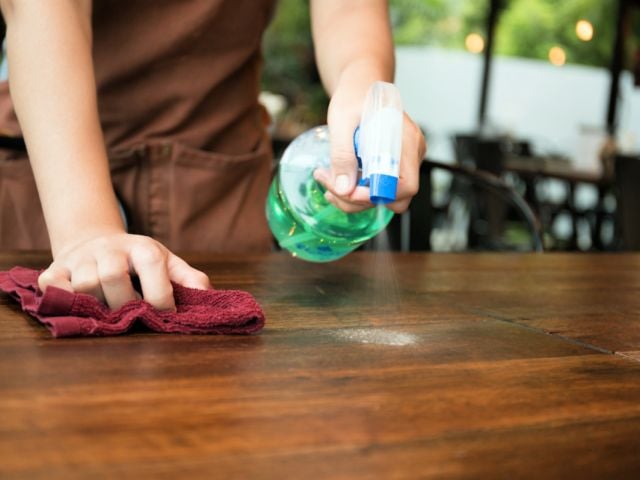
In a major win for people aiming to live healthier lives, EWG has helped usher in three new California laws that will reduce exposure to harmful chemicals in food, cosmetics and mattresses – and families across the U.S. will likely reap these benefits.
These laws are the result of the hard work of EWG, its supporters, state lawmakers and more. Gov. Gavin Newsom signed them on October 6 and 7, and they will take effect over the coming years.
“Despite vigorous pushback from industry groups and others, EWG, its supporters, lawmakers and Gov. Newsom got these crucial laws over the finish line – and everyone from children to consumers will benefit,” said EWG President Ken Cook.
“All Californians will have better protections against harmful chemicals, thanks to these three vital new laws,” Cook said.
The law to ban four problematic additives from food faced especially strong pushback, including from a former federal Food and Drug Administration official. Critics of the law knew that if they could block California from banning the additives, the FDA – known for its inaction on prohibiting these chemicals – might not assess their safety for many years, if ever.
And it’s not just Californians who stand to have healthier lives as a result. The state has the largest economy in the U.S. Companies that reformulate food and other products to comply with the state’s rules will likely also adjust to selling the same safer items in every other state.
EWG sponsored six bills in the California Legislature this year and succeeded in getting three enacted. The governor vetoed two bills targeting the “forever chemicals” known as PFAS in cleaning products and turf, and a third on lead tests of school drinking water.
But our victories this year in enacting ground-breaking legislation stiffens our resolve to keep pushing for safer products and healthier lives.
EWG worked with state lawmakers and stakeholders to overcome opposition and hostile amendments from industry groups and others that fought these health-protective measures, more concerned about their profit than the public good.
The three bills EWG successfully sponsored are:
- The California Food Safety Act (A.B. 418). This landmark legislation will end the use of brominated vegetable oil, potassium bromate, propyl paraben and Red Dye No. 3 in food products sold in the state. The chemicals are linked to serious health problems, such as a higher risk of cancer, nervous system damage and behavioral difficulties in children.
- Cosmetic safety (A.B. 496). This law updates the state’s groundbreaking 2020 Toxic-Free Cosmetics Act, which banned 24 chemicals from use in personal care products. It adds 26 toxic chemicals – which are not banned elsewhere in the U.S. – to the list of prohibited chemicals. These hazardous substances, including lily aldehyde and cyclotetrasiloxane, are linked to health problems, including a higher risk of cancer, genetic defects and harm to the developing fetus.
- Fiberglass in mattresses (A.B. 1059). Starting in 2027, this law will ban the sale of mattresses and upholstered furniture containing fiberglass. It will also prohibit upholsterers in California from using fiberglass to repair or reupholster mattresses and furniture.
Newsom vetoed the other three bills EWG sponsored:
- PFAS in cleaning products (A.B. 727). This would have banned forever chemicals from household and institutional cleaners starting in 2026. A 2028 deadline would have banned PFAS from institutional floor finishes and sealers. PFAS are known to cause a wide range of serious health problems.
- PFAS in artificial turf (A.B. 1423). This would have banned PFAS from products in widespread use – artificial turf and synthetic surfaces – starting in 2026. Artificial turf has recently become a source of concern for scientists, athletes and parents because of the many chemicals used in its production. Tests have shown turf contains PFAS and, if inhaled or absorbed, PFAS-laden dust presents an exposure risk.
- Lead in school drinking water (A.B. 249). This would have required lead tests at all school drinking water fountains and faucets. It also included a goal of reducing lead levels in school drinking water to zero and requires repair if levels top five parts per billion. The tests covered all fountains and faucets that have not already been tested and replaced, are used by children at all public Title I schools, and were built before 2010.
Advocacy can work
Our triumphs with half of the measures we sponsored show that advocacy can work – that when EWG and its supporters fight for legislation that we know will protect health, we all win.
Although the new laws apply only to products sold in California, they could see the rest of the U.S. benefiting by also ensuring everyday items sold everywhere become safer.
Manufacturers will have to refine and reformulate their products if they’re to be sold in California. The sheer size of the state’s economy means it doesn’t make financial sense for companies to then sell a different product in the rest of the country. So companies will just change their processes and suppliers to ensure all the food, cosmetics and mattresses they produce meet California’s strict criteria, wherever they’re sold.
That’s why EWG and its growing network of dedicated supporters will keep pushing for California to adopt even more laws tackling harmful chemicals, to help people live healthier lives and ensure that we know what’s going into the many different products we buy.
“Passing these three seminal laws is a momentous accomplishment for EWG and a testament to our steadfast commitment to safeguard public health, particularly the well-being of our children,” said Cook.
“We faced countless obstacles and hard-fought battles against well-funded industries that often prioritize profits over people. Yet we remained committed to our mission, driven by the unwavering belief that our communities should always come first,” he added.



